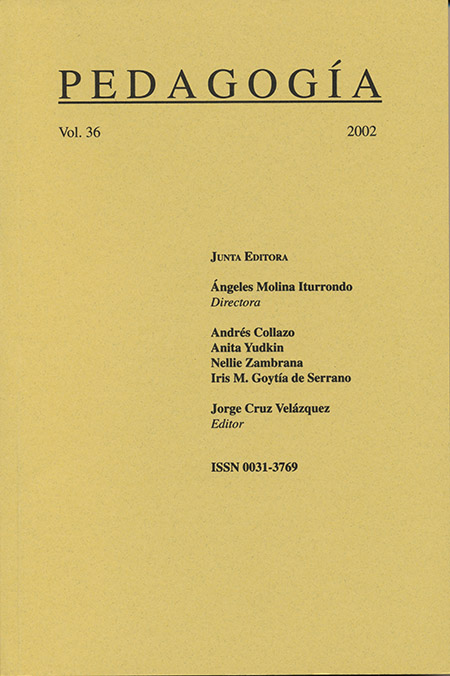Résumé
Cómo citar:
Ramos-Rodríguez, I. & Bravo-Vick, M. (2002). Prácticas para facilitar el desarrollo profesional en las escuelas de Puerto Rico: Encuesta a educadores. Pedagogía, 36(1), 92-125.
Références
Ahuja. R. S. (2000). The relative effectiveness of two different peer coaching programs and a structured self-evaluation program with elementary teachers using direct instruction. (Dissertation, George State University, 2000). Dissertation Abstract Intemational, 61, 2190A.
Baldanza, M. A. (1995). The relationship between staff development practices and schools of excellence in Minnesota. (Doctoral dissertation, University of Minnesota, 1994). Dissertation Abstracts International, 56/02, 409 A.
Berry, R. L. (1995). Effective professional staff development practices as perceived by teachers. (Doctoral Dissertation, University of Colorado, 1995). Dissertation Abstract International, 57, 0644A.
Blair, B. G. (1991). Does "supervise" mean "standerize"? Planning for effective supervision. Theory into Practice, 30(2), 102-108.
Blase, J. & Blase, J. (1999). Principals' instructional leadership and teacher development: Teachers' perspectives. Educational Administration Quarterly, 35(3), 349-378.
Cascio, C. (1995). National board for professional teaching standards: Changing teaching through teachers. Clearing House, 68 (4), 211-213.
Corley, T. R. (2000). Staff development and secondary science teachers: Factors that affect voluntary participation. (Doctoral dissertation, University of Alabama, 2000). Dissertation Abstracts International, 61, 2260 A.
Cramer, S. R., & Koskela, R. A. (1992). The clinical supervision cycle: A component of staff development programs. Chicago, IL: Paper presented at the Annual Conference of the Mid-Western Educational Research Association. (ERIC Document Reproduction Service No. ED 361 284)
Degroot, R. H. (1995). Attitude toward inservice education held by K-12 classroom teachers and school superintendents in South Dakota. (Doctoral dissertation, University of South Dakota, 1995). Dissertation Abstracts lnternational, 56, 2203A.
Gainey, D. D. (1990). Teacher evaluation and supervision for school improvement: Myth or reality? NASSP Bulletin, 74(524), 14-19.
Humphrey, R. S. (2000). Teachers' perceptions of the relationship between a collaborative staff developmental model and the use of cooperative learning in the classroom. (Dissertation, Seton Hall University, 2000). Dissertation Abstract International, 61, 1362A.
Hunter, M. (1986). Let's eliminate the preobservation conference. Educational Leadership, 43(6), 69-11.
Knowles, M. S. (1980). The modern practice of adult education: From pedagogy to andragogy. New York: Cambridge.
Loucks-Horsley, S., Harding, C. K., Arbuckle, M.A., Murray, L.B., Dubea, C., & Williams, M.K. (1987). Continuing to learn: A guidebook for teacher development. The Regional Laboratory for Educational Improvement of the Northwest and Islands, & Oxford: National Staff Development Council.
McCourt, J. R. (2000). The impact of peer coaching on teachers' perceptions of self-efficacy and on the transfer of Teacher Expectations and Students. (Dissertation, Widener University, 2000). Dissertation Abstract International, 61, 3062A.
Mullins, T. W. (1994). Staff development programs: A guide to evaluation. California: Corwin Press.
Novick, R. & Grimstad, J. (1999). Actual schools, possible practices. New directions in professional development. (Report No. EDD00036). Washington, DC: Office ofEducational Research and Improvement. (ERIC Document Reproduction Service No. ED 429 980).
Peterson, K. D., Stevens, D. & Ponzio, R. C. (1998). Variable data sources in teacher evaluation. Journal of Research and Development in Education, 31(3), 123-132.
Ramos Rodríguez, I. (1999). Desarrollo profesional de los educadores y las educadoras: Enfoque andragógico. Hato Rey: Publicaciones Puertorriqueñas.
Rettig, P. R. (1999). Differentiated supervision: A new approach. Principal, 78 (30), 36-39.
Singh, K. & Shifflette, L.M. (1996). Teachers' perspectives on professional development. Journal of Personnel Evaluation in Education, 10, 145-160.
Starratt, R. J. (1995). leaders with vision: The quest for school renewal. California: Corwin Press.
Udall, D., & Rugen, L. (1997). From the inside out: The expeditionary learning process of teacher change. Phi Delta Kappan. 78 (5), 404-408.
Zepeda, S. J. & Ponticelli, J. A. (1998). At cross-purposes: What do teachers need, want, and get from supervision? Journal of Curriculum and Supervision, 14(1), 68-87.

Ce travail est disponible sous licence Creative Commons Attribution - Pas d’Utilisation Commerciale 4.0 International.

